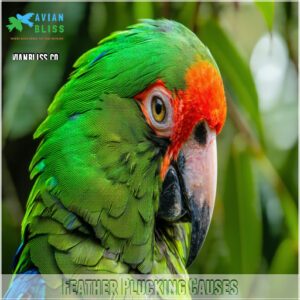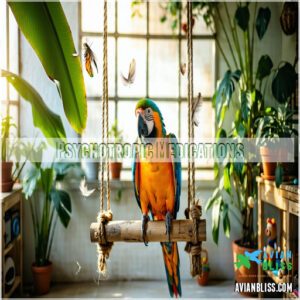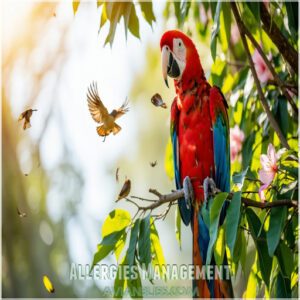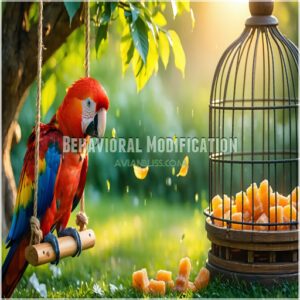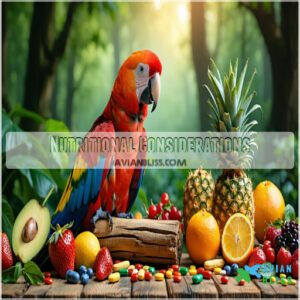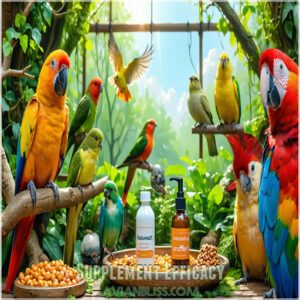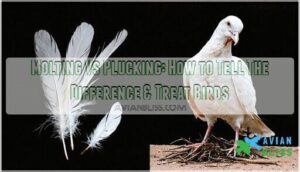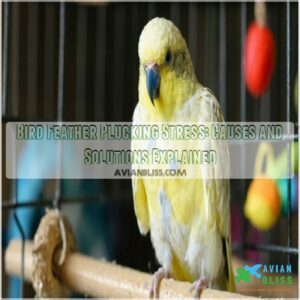This site is supported by our readers. We may earn a commission, at no cost to you, if you purchase through links.

Medications like psychotropic options and hormone treatments can help address anxiety and behavior issues.
It’s essential to work with a vet to find the right medication, as it’s often a process of trial and error.
By understanding the underlying causes of feather plucking, you can take the first step in helping your bird feel better – and there’s more to explore on effective treatments and solutions that can help your bird thrive.
Table Of Contents
- Key Takeaways
- Feather Plucking Causes
- Best Medications Overview
- Psychotropic Medications
- Hormone Treatments
- Feather Growth Supplements
- Skin and Feather Health
- Feather Plucking Prevention
- Behavioral Modification
- Nutritional Considerations
- Treatment Options Comparison
- Frequently Asked Questions (FAQs)
- How do I Stop my parrot from plucking feathers?
- How do you treat a feather plucking bird?
- What is feather-plucking in birds?
- How do I prevent feather plucking?
- Is feather plucking bad for birds?
- When should I see a vet for feather plucking?
- What medicine is used for bird plucking?
- How do you treat feather plucking in birds?
- How to treat feather loss in birds at home?
- How do you cure feather picking?
- Conclusion
Key Takeaways
- You’ll need to work with a vet to find the right medication for your bird’s feather plucking, as it’s often a process of trial and error to determine the best treatment.
- Medications like psychotropic options and hormone treatments can help address anxiety and behavior issues, but it’s essential to use them under veterinary guidance to ensure safety and effectiveness.
- You can’t just rely on medication – you’ll also need to address underlying issues like stress, environmental factors, and nutritional deficiencies to prevent feather plucking and promote healthy feather growth.
- By providing a balanced diet, reducing stress, and creating a stimulating environment, you can help your bird feel happy and healthy again, and prevent feather plucking from becoming a chronic issue.
Feather Plucking Causes
Feather plucking in birds happens for three main reasons: physical, psychological, or environmental issues.
Pinpointing the exact cause can feel tricky, but understanding these factors is the first step to helping your feathered friend thrive.
Physical Factors Contributing
Feather plucking can feel like a puzzle, but physical causes often hold important clues.
Your bird might pick feathers due to skin infections, pain management challenges from injuries, or hormonal imbalances triggering discomfort.
Feather damage from physical trauma also fuels compulsive plucking.
A vet visit is key to tackling these issues and beginning effective avian plucking treatment plans for relief.
Psychological Factors Contributing
Bird anxiety can spiral into compulsive plucking if their mental health is overlooked.
Stress management and emotional support are critical to addressing avian psychology.
Changes like loneliness or boredom often trigger behavioral issues.
Understand your bird’s mindset:
- Sudden shifts in routine causing distress.
- Lack of mental stimulation sparking feather-destructive behavior.
- Insufficient bonding time leading to stress-induced habits.
Environmental Factors Contributing
Sometimes it’s not stress but your bird’s surroundings making things worse.
Cage design matters; cramped spaces fuel frustration.
Lighting effects and air quality play a big role too—dim spaces or poor airflow harm avian health.
Noise pollution and low humidity levels can stress birds, affecting their behavior.
Adjusting these environmental factors supports stress management and stops feather plucking in its tracks.
Best Medications Overview
When your feathered friend starts plucking, it’s a call for help you can’t ignore.
Medications designed for feather plucking, like bird anxiety and behavior medication, can offer real relief, from psychotropic options to specific treatments, these antiplucking remedies target the root behavior.
Medication safety always comes first—working closely with an avian vet is key to ensuring Bird Wellness and every prescription aligns with your parrot’s needs.
Feather Care isn’t one-size-fits-all, some medications address stress, while others tackle hormonal imbalances or underlying health issues.
Whether it’s an extra-label prescription or a calming supplement, finding the right bird plucking medication is often a process, the right remedies can restore not just feathers but your bird’s confidence and overall Avian Health.
Psychotropic Medications
Psychotropic medications can help manage your bird’s feather plucking by addressing underlying anxiety or compulsive behaviors.
These treatments require careful dosing and monitoring, but they often provide relief when other strategies haven’t worked, offering a solution through medications.
Amitriptyline Usage
If your feathered friend’s pecking seems endless, Amitriptyline might offer relief.
This antiplucking medication for birds is a psychotropic option often used for feather plucking treatment. Dose management is key, with a range of 1–5 mg/kg.
Watch for side effects like appetite changes or liver issues. Patience matters—the medication takes weeks to show results.
- Dose management guarantees safety and effectiveness.
- Potential side effects include anorexia or hepatic issues.
- Treatment duration may extend several weeks for results.
Clomipramine Dosage
In tackling bird behavior issues like feather plucking, Clomipramine shines as a trusted bird anxiety medication.
This antiplucking medication for birds is dosed carefully, typically 0.25 to 5 mg/kg daily, depending on the case.
Proper dosage control is key to feather regrowth.
Timing matters too—steady medication guarantees results, making this a cornerstone psychotropic medication for feather plucking treatment.
For effective treatment, understanding psychotropic medications is vital for addressing feather plucking in birds.
Haloperidol Administration
Haloperidol, a bird anxiety medication, can work wonders as an antiplucking treatment for birds struggling with stress.
Dosage guidelines vary based on bird size—typically 0.15 mg/kg for larger birds and 0.2 mg/kg for smaller ones.
Administration tips include careful measurement and consistent timing, while effective for psychotropic medications, watch for medication side effects and adjust treatment duration with professional advice.
The key to successful treatment is monitoring and adjusting the dosage as necessary to minimize side effects, ensuring the bird receives the antiplucking treatment it needs.
Fluoxetine Effects
While haloperidol targets immediate behavioral shifts, fluoxetine offers temporary relief for compulsive plucking in birds.
This bird behavior medication reduces feather plucking but can lead to short-lived treatment outcomes, with relapses occurring after weeks.
Feather plucking, a common disorder, can stem from medical or environmental issues, as discussed on the feather-plucking Wikipedia page.
Fluoxetine dosage must be carefully managed as it may cause severe psychological side effects in some birds, it’s not a magic fix but can aid feather regrowth temporarily.
Hormone Treatments
When your bird’s feather plucking is tied to hormonal imbalances, hormone treatments like deslorelin acetate or leuprolide acetate can help regulate their behavior.
These medications work by safely reducing the production of hormones that may trigger the plucking cycle, providing a much-needed sense of relief.
Deslorelin Acetate Implant
When feather plucking feels like a never-ending battle, Deslorelin Acetate implants can offer a lifeline.
This GnRH agonist works as a slow-release hormone therapy, targeting reproductive issues tied to feather plucking.
It’s a safe, effective antiplucking medication for birds, lasting months with one implantation.
Always seek veterinary guidance to guarantee proper Deslorelin dosage and maintain your bird’s avian health.
Leuprolide Acetate Injection
Leuprolide acetate is a key hormone therapy for managing feather plucking caused by hormonal imbalances.
This anti-plucking medication helps regulate sex hormones and reduce feather-destructive behavior.
Here’s what to know:
- Administered via injection for precise dosage.
- Typically used every 3–6 months.
- Supported by medical research and veterinary care.
- Safe for long-term bird health.
- Aided by GnRH agonists’ function.
The administration and support of this medication are crucial for its effectiveness, ensuring it is used in a manner that promotes the health and well-being of the birds.
GnRH Agonists Function
GnRH agonists, including deslorelin acetate and leuprolide acetate, help balance hormones by lowering sex hormone levels.
This hormone regulation can improve bird wellness during feather plucking treatment.
Think of it as hitting the reset button for your bird’s endocrine balance, promoting healthy feather growth.
| GnRH Usage | Hormonal Impact | Benefits |
|---|---|---|
| Antiplucking medication birds | Lowers hormones | Reduces mating stress |
| GnRH Therapy | Regulates hormones | Stops plucking triggers |
| Long-term Effects | Stabilizes systems | Boosts feather regeneration |
Feather Growth Supplements
You mightn’t realize it, but supplements can play a big role in restoring your bird’s feathers and overall health.
From biotin to probiotics, these carefully chosen additions help provide the nutrients and support needed for vibrant feather regrowth.
Biotin Benefits
Biotin is a powerhouse for feather growth and regeneration, boosting your bird’s plumage from lackluster to vibrant.
Beyond feathers, this vitamin bolsters beak health and overall bird nutrition.
You can find a variety of biotin products for your birds to support your bird’s well-being.
Add biotin supplements to your bird’s routine to improve their quality of life.
- Supports stronger, healthier feathers
- Encourages faster feather regeneration
- Enhances beak health
- Combats feather plucking naturally
- Easy to mix in bird supplements
Calcium Supplements Importance
After biotin supports feather quality, bird calcium takes center stage for feather strength, bone density, and even beak health.
A balanced diet, including nutrients for feather growth, is essential for overall feather health.
Calcium benefits extend to calcium metabolism, which influences overall avian nutrition. Without enough calcium supplements, feathers may weaken, leaving your feathered friend vulnerable. A pinch of the right calcium can make those feathers shine stronger than any polished trophy.
Probiotics Role
Probiotics are tiny heroes for your bird’s gut health, working wonders for their overall wellness.
They improve microbiome balance and support intestinal care, essential for birds prone to feather plucking.
Look for feather plucking supplements formulated for avian needs, like:
- Parrot calming supplements
- Bird probiotics
- Feather-specific blends
- Gut-protective bird health supplements
- Nutritional boosters for intestinal care
Using bird probiotics products can be a great way to support your bird’s health.
Your bird’s feathers will thank you!
Skin and Feather Health
You’ll need to watch your bird’s skin and feathers closely, as they’re often the first signs of health issues that can lead to feather plucking.
When you notice any changes in your bird’s skin or feather condition, don’t wait to contact your vet, as early treatment with the right medications can prevent more serious problems from developing, which is crucial for addressing feather plucking.
Skin Conditions Treatment
While supplements support feather health from within, let’s look at treating those pesky skin issues that can trigger feather picking disorder.
Your bird’s skin needs specialized care for infection control and wound healing.
Here’s what works best for common skin conditions:
| Condition | Treatment | Timeline |
|---|---|---|
| Bacterial Infections | Targeted Antibiotics | 7-14 days |
| Fungal Issues | Antifungal Medication | 14-21 days |
| Dermatitis | Topical Treatment | 5-10 days |
Treating skin lesions promptly helps prevent bird self-mutilation and promotes feather repair .
You’ll want to apply medications exactly as prescribed for the best results in managing these conditions.
Allergies Management
When your bird shows signs of skin irritation and feather plucking, swift allergy testing is essential.
Managing allergies involves a multi-faceted approach: control environmental triggers with HEPA filters, maintain proper humidity levels to prevent respiratory issues, and work with an avian vet to develop a targeted treatment plan.
Consider specialized bird stress relief treatments and non-toxic topical solutions for immediate comfort.
Nutritional Deficiencies Correction
While managing allergies helps, proper nutrition forms the backbone of healthy feathers.
Here are the key steps to correct nutritional deficiencies and stop feather plucking:
- Start Vitamin Therapy with a balanced A, D3, and E complex
- Restore Mineral Balance through calcium and trace mineral supplements
- Make gradual Dietary Adjustments to include varied fresh foods
- Add targeted Nutrient Supplements based on blood work results
You’ll need patience – correcting deficiencies takes time, but your bird’s feathers will thank you.
Feather Plucking Prevention
You’ll find it’s much easier to prevent feather plucking than to treat it once it starts, just like it’s better to bird-proof your home before bringing home your feathered friend.
While medications can help manage severe cases, you’ll get the best results by creating an enriching environment with proper nutrition, social interaction, and stress reduction techniques from day one.
Environmental Enrichment
Feather health isn’t just about medicine—it’s about creating the perfect home.
Upgrade your cage design with spacious layouts, add bird enrichment activities like toy rotation to keep boredom at bay, and combine light therapy with natural sunlight for mood boosts.
Noise reduction matters too; quiet surroundings calm nerves.
Environmental factors shape happier birds, making avian environmental enrichment a cornerstone for feather plucking prevention.
Socialization Techniques
A stimulating environment is great, but parrots crave connection.
Socialization, like bird interaction within flock dynamics, is key for feather plucking prevention.
Play therapy and environmental stimulation through bird socialization strengthen the human-bird bond.
Bird behavior modification through social learning can substantially reduce feather destructive behaviors.
Consider these techniques as part of your bird’s socialization training.
Understanding feather plucking stress is essential for developing effective socialization strategies to prevent this behavior in birds.
Stress Reduction Methods
Creating calm environments is key to stress relief for your feathered friend.
Try relaxation techniques like bird massage and mindful interaction, including gentle handling and petting.
These techniques soothe anxiety and also strengthen your bond.
For compulsive plucking birds, reducing triggers and providing outlets for natural behaviors are essential.
Explore stress-busting strategies like foraging toys, perches, and baths, offering a healthy distraction from feather destructive behavior.
Behavioral Modification
Training your bird with positive reinforcement and distraction techniques can help address feather plucking.
These behavioral modification strategies are key to reducing stress and redirecting your bird’s focus, and they’re an essential part of a thorough treatment plan that utilizes distraction techniques.
Positive Reinforcement Training
Positive reinforcement training is a powerful tool in your feather plucking treatment toolkit.
It’s all about rewarding your bird for good behavior, making them feel like a feathered Einstein.
This training technique shapes bird behavior by offering treats, praise, or other rewards when they display desired behaviors.
Clicker training is a popular method, using a distinct sound to mark the behavior you want to reinforce, which is a form of clear communication that helps your bird associate actions with rewards.
This clear communication channel helps your bird associate actions with rewards, leading to faster learning and fewer behavioral triggers.
Distraction Strategies
Distraction strategies are a powerful tool in your toolkit for addressing feather plucking in birds.
These techniques shift your bird’s attention away from compulsive plucking by engaging their senses and curiosity.
Introduce novel sensory toys with interesting textures, sounds, and colors.
Play techniques, like teaching your bird to target or recall, can also redirect their focus.
Additionally, making simple environmental changes, such as rearranging perches or adding new toys, can create an attention shift and provide mental stimulation to alleviate bird stress.
These strategies, combined with a reward system for positive behaviors, form a thorough approach to feather plucking treatment.
Owner Education Importance
As a bird parent, you’re your parrot’s hero—their feather-plucking guardian.
It’s not just about tricks to distract them; it’s also about knowing the whys and hows of their behavior.
Your role in their recovery is massive. You’re the eyes and ears for the vet, spotting triggers and progress.
Together, you’re a dream team, solving the plucking puzzle.
So, keep learning, stay curious, and never underestimate the power of owner education in feather plucking treatment. It’s a key part of the solution.
Nutritional Considerations
Nutrition plays a pivotal role in maintaining the vibrant health of your feathered friend’s plumage.
A well-balanced diet, supplemented with essential vitamins and minerals, is key to preventing feather plucking and promoting healthy feather growth.
Balanced Diet Composition
Beyond behavior tweaks, your feathered friend’s diet plays a pivotal role in feather health.
A balanced diet is the cornerstone of a vibrant, pluck-free parrot.
Aim for a mix of 60-70% pellet nutrition, 20% fruit variety, and 10% seed alternatives.
This blend provides essential building blocks for feather growth, like vitamins A and E and omega-3 fatty acids, ensuring vibrant plumage and overall avian nutrition.
For ideal results, consider using parrot food pellets as the primary source of pellet nutrition.
- Imagine the joy of a parrot showing off its colorful, healthy feathers.
- Picture your bird happily munching on a balanced, nutritious meal.
- Envision a peaceful home, free from the stress of feather plucking.
Vitamin and Mineral Supplements
Vitamin and mineral supplements are key to meeting your bird’s vitamin needs and preventing mineral deficiency.
These feather boosters help maintain nutrient balance, ensuring your bird’s body and feathers are healthy.
Look for bird vitamins or a bird multivitamin formulated for feather growth, containing biotin, an essential nutrient for feather health.
Always choose reputable brands to support supplement safety and effectiveness.
Address any vitamin deficiency promptly to support your bird’s overall health and vibrant feathers.
Understanding essential vitamins is vital for providing the necessary nutrients for peak bird health.
Omega-3 Fatty Acids Benefits
The benefits of omega-3 fatty acids for feather health are no secret, and these good fats are a hot topic in avian nutrition.
Here’s why:
- Fighting inflammation – Omega-3s are known for their anti-inflammatory properties, helping to soothe irritated skin and promote healthy feathers.
- Feather growth – These fatty acids are essential for healthy feather development, keeping feathers strong and shiny.
- Brain health – Omega-3s support brain function, boosting mood and reducing anxiety, which can help with feather plucking caused by stress or boredom.
- Heart health – They promote a strong, healthy heart, reducing the risk of cardiovascular issues in pet birds.
You can find omega-3s in fish oil, flaxseed, and walnuts, offering an easy, natural boost to your bird’s diet.
Treatment Options Comparison
Let’s compare the effectiveness of various treatment options for feather plucking in birds, from medication and supplements to behavioral therapy.
Each has its own pros and cons, and understanding these will help you make the best choice for your feathered friend.
Medication Effectiveness
The road to effective treatment for feather plucking can be a long one, with twists and turns.
Medications can take weeks to show their full effect, and even then, dosage adjustments might be needed.
| Medication | Dosage |
|---|---|
| Amitriptyline | 1–5 mg/kg, PO, once to twice daily |
| Clomipramine | 1 mg/kg/day, PO |
| Haloperidol | 0.15 mg/kg for larger birds |
| 0.2 mg/kg for smaller birds |
Bird owners must commit to the journey, especially regarding psychotropic medications, as it’s a process of discovery to find what works best for your feathered friend.
Supplement Efficacy
Supplements are another feather-boosting option in your toolkit.
These feather plucking remedies are generally safe and focus on nutrient absorption and overall bird wellness.
Vitamin therapy is a popular approach, with options like FeatheredUp! and UnRuffledRx offering biotin and other vitamins.
Probiotics, like bird probiotics, also support gut health, which is key to feather growth.
Here’s a quick overview of some popular feather growth formulas:
| Supplement | Key Benefits |
|---|---|
| FeatheredUp! | Biotin for feather health |
| UnRuffledRx | Calcium for strong bones |
| Bird Probiotics | Healthy digestion |
| FeatherSoft | Softens feathers |
Behavioral Therapy Success
You’ll often find behavioral therapy success in treating feather plucking.
Understanding the social dynamics of birds, such as those of the bird flock behavior, can help inform effective therapy techniques.
| Therapy Techniques | Bird Training | Behavior Modification |
|---|---|---|
| Reward Systems | Stress Management | Positive Reinforcement |
| Socialization | Desensitization | Counterconditioning |
| Environmental Enrichment | Foraging | Preening |
| Exercise | Mental Stimulation | Calming Signals |
| Consistency | Patience | Persistence |
Frequently Asked Questions (FAQs)
How do I Stop my parrot from plucking feathers?
Like a puzzle, stopping your parrot’s feather plucking requires patience.
You’ll need to address underlying issues, consult a vet, and try behavioral changes to help your bird feel happy and healthy again.
How do you treat a feather plucking bird?
You’ll treat a feather plucking bird by addressing underlying issues, consulting a vet, and modifying its environment, diet, and behavior to reduce stress and promote overall well-being and healthy feathers.
What is feather-plucking in birds?
Thou seekest wisdom, and you’re wondering, what’s feather-plucking in birds, right?
It’s a behavior where birds pull out their feathers, often due to stress, health issues, or environmental factors, you’ll find.
How do I prevent feather plucking?
You can prevent feather plucking by providing a balanced diet, a stimulating environment, and addressing underlying health issues, while also ensuring proper socialization and reducing stress.
Is feather plucking bad for birds?
You should know that feather plucking can be harmful, causing pain, infection, and stress in birds, so it’s imperative to address the underlying issues promptly.
When should I see a vet for feather plucking?
Like a red flag waving, feather plucking signals distress; you should see a vet when you notice excessive plucking, as it may indicate underlying health issues needing prompt attention.
What medicine is used for bird plucking?
You’ll use medications like amitriptyline, clomipramine, or fluoxetine to help your bird stop plucking, under veterinary guidance, to address underlying issues and reduce stress.
How do you treat feather plucking in birds?
You’ll treat feather plucking in birds by addressing underlying causes, consulting a vet, and trying behavioral modifications, dietary changes, and environmental adjustments to reduce stress and promote overall health.
How to treat feather loss in birds at home?
You can help your bird by providing a balanced diet, reducing stress, and creating a stimulating environment with toys and social interaction to address feather loss at home effectively.
How do you cure feather picking?
You’ll address underlying issues, consult a vet, and try behavioral modifications, dietary changes, and environmental adjustments to cure feather picking in birds, ensuring a thorough approach for their well-being.
Conclusion
Breaking the cycle of feather plucking, you’ll find the best medications for feather plucking in birds are just the beginning.
By working with a vet, you’ll discover the right treatment, whether it’s psychotropic options or hormone treatments, to help your bird thrive.
Making the best medications for feather plucking in birds a key step in achieving a happier, healthier pet.
- https://www.petmd.com/bird/conditions/skin/bird-feather-plucking
- https://www.merckvetmanual.com/multimedia/table/reducing-feather-plucking
- https://bestfriends.org/pet-care-resources/bird-feather-plucking-what-know
- https://birdsupplies.com/blogs/news/top-5-feather-plucking-remedies-for-birds
- https://www.youtube.com/watch?v=TfOCjf6YgV8

